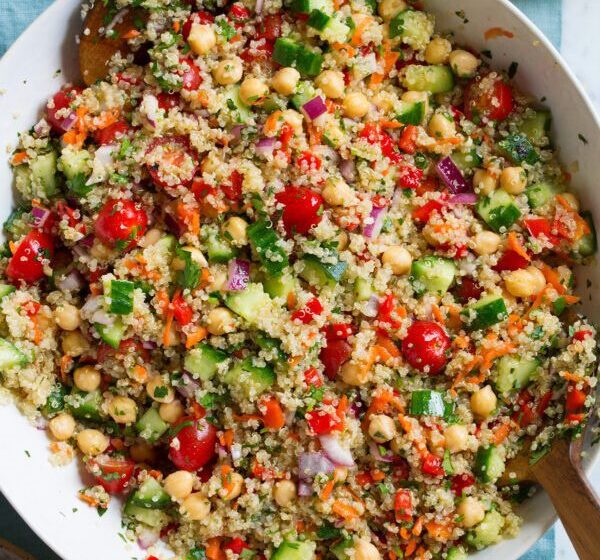Quinoa salad is a nutritious and versatile dish that features quinoa as its main ingredient. Quinoa is a protein-rich grain-like seed that originated in the Andean region of South America. Quinoa salad typically combines cooked quinoa with a variety of fresh vegetables, herbs, and other ingredients to create a flavorful and filling salad.
Here are some interesting facts about quinoa salad:
- Quinoa, an ancient grain, has been cultivated for millennia and held sacred significance among the ancient Incas. It is often referred to as an “ancient grain,” although it is technically a seed.
- Quinoa is recognized as a complete protein since it contains all nine essential amino acids crucial for supporting bodily functions and promoting healthy growth. This makes quinoa salad a great choice for vegetarians and vegans looking to meet their protein needs.
- Gluten-Free: Quinoa is naturally gluten-free, making quinoa salad a suitable option for individuals with gluten sensitivities or those following a gluten-free diet.
- Versatile Ingredient: Quinoa is incredibly versatile and can be used in a variety of dishes, including salads, grain bowls, stir-fries, and even as a substitute for rice or pasta.
- Nutrient-Rich: Quinoa is packed with essential nutrients. It is a good source of fiber, magnesium, iron, zinc, and B vitamins. Including quinoa in your salad can help boost the nutritional value of your meal.
- Quick Cooking Time: Unlike other whole grains, quinoa has a relatively short cooking time. It typically takes about 15-20 minutes to cook, making it a convenient option for quick and easy salads.
- Ancient Superfood Status: Quinoa is often referred to as a “superfood” due to its impressive nutritional profile. Due to its health benefits and culinary adaptability, quinoa has gained widespread popularity across the globe.
- Flavor Absorption: Quinoa readily absorbs the flavors of the ingredients it is combined with, making it an excellent base for salads. It pairs well with a wide range of vegetables, herbs, and dressings, allowing for endless flavor combinations.
- Satiety and Weight Management: The high protein and fiber content of quinoa can help promote feelings of fullness and aid in weight management.
- Sustainability: Quinoa is considered an environmentally friendly crop, as it requires less water and produces higher yields compared to other grains. The cultivation of quinoa has the potential to support and promote sustainable farming practices.
- These interesting facts highlight the nutritional benefits, versatility, and cultural significance of quinoa salad. Incorporating this ancient grain into your salads can add a nutritious and flavorful element to your meals.
Here are a few health benefits of quinoa salad:
- Nutrient-Rich: Quinoa salad is packed with essential nutrients. Quinoa itself is a complete protein, containing all nine essential amino acids, making it beneficial for muscle repair and growth. It is also a good source of fiber, which supports digestion and helps maintain a healthy weight. Additionally, quinoa provides minerals such as magnesium, iron, and zinc, as well as B vitamins.
- High in Antioxidants: Quinoa contains various antioxidants, such as quercetin and kaempferol, which help protect against oxidative stress and reduce the risk of chronic diseases like heart disease and certain types of cancer.
- Gluten-Free Option: Quinoa is naturally gluten-free, making it suitable for individuals with gluten sensitivities or those following a gluten-free diet. Quinoa salad offers a nutritious alternative to traditional grain-based salads.
- Blood Sugar Control: Quinoa has a low glycemic index, meaning it doesn’t cause significant spikes in blood sugar levels. This makes it a favorable choice for individuals managing diabetes or seeking to stabilize blood sugar levels.
- Heart Health: The combination of fiber, protein, and healthy fats found in quinoa salad can contribute to heart health. It may help reduce cholesterol levels, maintain healthy blood pressure, and support overall cardiovascular function.
- Weight Management: Quinoa salad is a satisfying and nutrient-dense option that can help with weight management. The high protein and fiber content can increase feelings of fullness and reduce overall calorie intake.
- Versatile and Customizable: Quinoa salad is incredibly versatile and can be customized to include a variety of vegetables, herbs, and dressings. This allows for a range of flavors and textures while maximizing nutritional value.
- Plant-Based Protein: Quinoa is an excellent plant-based protein source, making quinoa salad a great option for vegetarians and vegans. Protein is essential for cell repair, building muscle, and supporting overall health.
- By incorporating quinoa salad into your diet, you can enjoy these health benefits while indulging in a flavorful and nutritious meal. Its nutrient density, versatility, and gluten-free nature make it a popular choice among health-conscious individuals and those seeking to add more whole grains and plant-based proteins to their meals.
More Salad Recipes

quinoa salad
Ingredients
- 1 cup cooked quinoa
- 1 cup diced vegetables (such as cucumber, bell peppers, cherry tomatoes)
- 1/4 cup diced red onion
- 1/4 cup chopped fresh herbs (such as parsley, cilantro, or mint)
- 1/4 cup crumbled feta cheese (optional)
- 2 tbsp extra-virgin olive oil
- 2 tbsp lemon juice
- Salt and pepper to taste
Instructions
- In a large bowl, combine the cooked quinoa, diced vegetables, red onion,and fresh herbs.
- In a separate small bowl, whisk together the olive oil and lemon juice to make the dressing. Season with salt and pepper to taste.
- Pour the dressing over the quinoa mixture and toss well to ensure everything is evenly coated.
- If desired, sprinkle crumbled feta cheese over the salad for added flavor and creaminess.
- Allow the flavors to meld together for a few minutes before serving.
- Serve the quinoa salad as a refreshing side dish or as a light and nutritious main course.
Notes
Conclusion
In conclusion, this simple and unique quinoa salad recipe offers a delicious and nutritious combination of flavors and textures. The cooked quinoa serves as a protein-rich and fiber-packed base, while the diced vegetables, fresh herbs, and optional feta cheese add a vibrant mix of colors and flavors. The dressing, made with olive oil and lemon juice, provides a tangy and refreshing element that brings the salad together. Whether enjoyed as a side dish or a light main course, this quinoa salad is versatile and customizable to suit individual preferences. Embrace the versatility of quinoa and savor the health benefits and delightful taste of this simple and unique quinoa salad recipe.
FAQs
How long will quinoa salad stay fresh?
Ans: Quinoa salad can typically stay fresh for about 3 to 5 days when properly stored in the refrigerator. It’s important to store it in an airtight container to maintain its freshness and prevent it from drying out. However, the duration may vary depending on the specific ingredients used in the salad and the freshness of the vegetables. It’s recommended to consume the quinoa salad within the first few days for the best taste and texture. If you notice any signs of spoilage, such as a sour smell or changes in color or texture, it’s best to discard it to ensure food safety.
What are the benefits of adding quinoa to salad?
Ans: Adding quinoa to salad offers several benefits:
- Nutritional Boost: Quinoa is a nutrient-dense grain that adds a significant nutritional boost to salads. It is a complete protein, rich in fiber, and packed with essential vitamins and minerals, including iron, magnesium, and B vitamins.
- Satiety and Weight Management: Quinoa is a good source of fiber and protein, both of which contribute to feelings of fullness and satiety. Adding quinoa to salad can help you stay satisfied for longer, potentially aiding in weight management.
- Enhanced Texture: Quinoa adds a delightful texture to salads. Its slightly chewy texture contrasts well with the crispness of vegetables, creating a more satisfying eating experience.
How many times a day can you eat quinoa?
Ans: There is no strict limit on how many times a day you can eat quinoa. Quinoa is a nutritious grain and can be included in your diet as part of a balanced meal plan. The frequency of consuming quinoa can vary depending on your individual dietary needs, preferences, and overall calorie and nutrient intake goals. However, it’s important to maintain a varied diet that includes a mix of different grains, proteins, fruits, vegetables, and other essential food groups for optimal nutrition. It’s always a good idea to consult with a healthcare professional or a registered dietitian who can provide personalized recommendations based on your specific dietary requirements.
What makes quinoa better?
Ans: Quinoa is considered better than many other grains for several reasons:
- Complete Protein: Quinoa is a complete protein source, meaning it contains all nine essential amino acids that our bodies need. This makes it a highly suitable option for individuals following vegetarian, vegan, or protein-conscious diets, as it aids in meeting their protein requirements.
- Nutrient-Dense: Quinoa is packed with essential nutrients, including fiber, magnesium, phosphorus, and iron. It also contains vitamins like B vitamins and vitamin E. The nutrient density of quinoa makes it a valuable and beneficial inclusion in a well-rounded and balanced diet.
- Gluten-Free: Quinoa is naturally gluten-free, making it suitable for individuals with gluten sensitivities or those following a gluten-free diet. Quinoa provides a safe and nourishing substitute for grains that contain gluten, offering a gluten-free option without compromising on nutrition.
- Low Glycemic Index: Quinoa has a relatively low glycemic index, meaning it does not cause a rapid spike in blood sugar levels. This makes it a favorable choice for individuals managing blood sugar levels or seeking to maintain steady energy levels.



